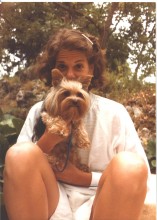
The disease cancer at first disarms its host by snipping away the simple things. For pet owners afflicted with the disease, the small task of walking their dogs becomes a monumental chore. The addition of often-lengthy medical treatment presents another problem: Who will watch the cat? Who will feed the bird? This is how cancer begins to directly affect those diagnosed, and the theft of these small daily pleasures often triggers a domino effect on a person’s psyche. Luckily, those in need of help still have Gilda Radner. The late Saturday Night Live star understood the importance of having a pet as an ally through adversity; her dog Sparkle provided her with one of her most treasured relationships in the waning months of her bout with ovarian cancer. This relationship resonates in her legacy, Gilda’s Club, a chain of national clubhouses for anyone touched by cancer, that spread across the face of the country like freckles on Roseannadanna’s cheeks. The Club has set up a support group that deals directly with pet-related issues, so that pet owners can manage not only their own lives, but the lives of their pets as well.
The Friends of Pets Networking Group is a monthly meeting held by Gilda’ s Club, and it provides a forum for cancer patients to share their experiences with their pets. Some of which were in tune with their owners’ condition long before a doctor’s diagnosis.
“Pets pick up on energy. They can tell if something’s wrong with their owners,” says Deborah Lamberti, who has chaired the group for eight years. “I’ve had one group member recount to me about how for weeks her cat would suspiciously nudge the side of her breast, and two weeks later she found out she had breast cancer.”
It’s this strong, nearly unexplainable bond that proves hardest to reconcile when a pet owner is diagnosed with cancer. Though an unpleasant thought, pet owners often have to weigh the validity of maintaining their pets while coping with a debilitating illness. Many easily figure that the best move would be to get rid of their pets in preparation for the worst, but Lamberti—a psychoanalyst who specializes in treating those affected by “life-redefining” incidents—says this is the sort of thinking that Friends of Pets works to combat.
“People can often feel greatly overwhelmed by cancer, and sometimes the volume of the issue is too much to bear,” she says. “By having something to care for, something to focus their energy on other than themselves and their illness, the issue becomes more manageable. Pets can often serve as a vessel for much-needed positivity.” These are the types of things discussed in the group and they often give way to headier discussions, but in a piece-by-piece way. Rather than speak about the experience of having cancer as a whole, group members can focus on their pets as touchstones.
These are not topics that have neglected to touch Lamberti personally. Herself, a member of what she terms a “cancer cluster” family (she is to date one of a few in her family who has not had it. Two years ago her dog contracted a rare form of melanoma. It was given three months to live. Needless to say, that was two years ago.
“The members of the group know that I, too, am dealing with these issues,” says Lamberti. “It’s not as though they’re sharing things with someone who can’t give back a little.”
Friends of Pets also doubles as a contact network for dealing with the administrative mess that comes with cancer. As mentioned before, walking the dogs becomes a hassle. The cost of cancer treatment trumps what would usually be paid to a dog walker, so those in the group can network with other members who have access to free dog-walkers, or any other small comforts that come with the baggage of cancer treatment.
This is all in line with the mission statement of Gilda’s Club (“Living with cancer? Come as you are.”), which finds a way in each of its efforts to keep its founder’s spirit at its core. The organization is merely an extension of Radner herself. As a performer, Gilda Radner’s greatest asset was not her ability to throw herself off walls as an over-imaginative schoolgirl, nor was it the twang of her “wa-wa’s” that haunts a certain “The View” host until this very day. No, Gilda Radner’s strength as a performer came through the goodness of her characters; the way that she straddled simple silliness and layered good nature. As an audience, she made you feel like each one of those characters was her small way of letting you know her. You felt as though you were her friend. And with the outward reaching arms of Gilda’s Club, her legacy of love and laughter lives on.
For the Best that Pet Lifestyle and Animal Welfare has to offer follow Wendy Diamond on Facebook, Twitter, and right here at AnimalFair.com!
